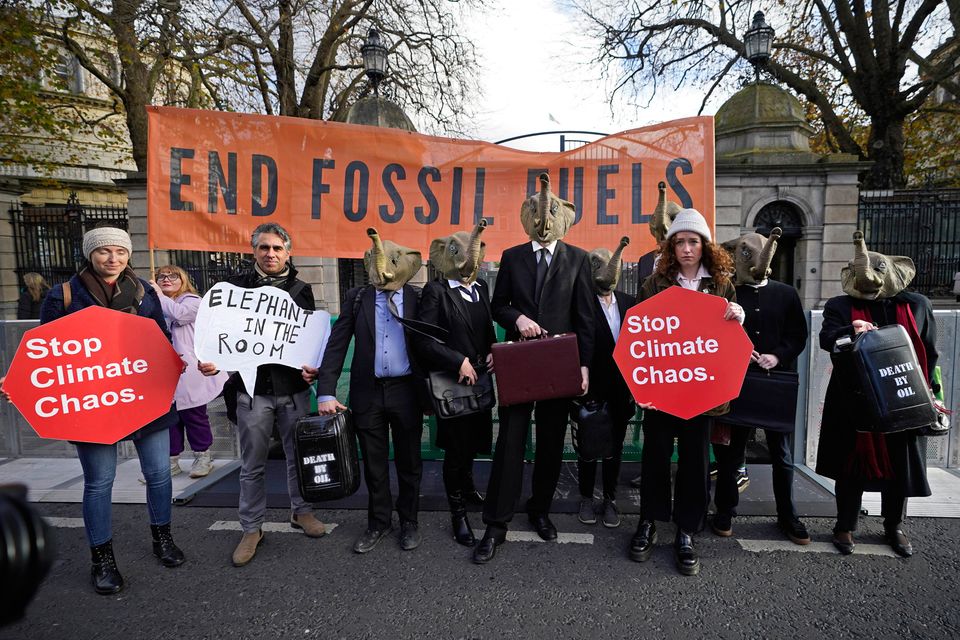Suzanne Crowe: How healthcare is actually harming us thanks to climate change – and what can be done
Stop Climate Chaos members, dressed in black business suits and wearing elephant masks, outside Leinster House in Dublin ahead of Cop28. Photo: PA
Anyone brought up in a farming family can tell you that human and animal health depend on a flourishing natural environment.
For centuries, the effects of over-fishing and disruption of nutrient cycles in the soil and water have been observed and understood.
With the Lancet stating that climate change is the greatest global threat to health facing us in the 21st century, a clear connection between climate and human health has been drawn.
Those who work in the healthcare sector can view climate change as outside their responsibility – greenhouse gases are the least of their worries when they’re busy saving lives and administering treatments. However, healthcare is unwittingly harming health in its efforts to improve it because of its contribution to climate change.
Wildfires and droughts seem very far away from us and we could be forgiven for believing that our country will not be affected by climate change. This is not true.
Rising temperatures and sea levels will alter the pattern of viral and vector-borne illnesses in Ireland. The arrival of tropical diseases such as malaria and dengue fever will cause widespread illness, as our population has little native immunity. Like the arrival of European people carrying measles to the First Nations people on the continent of America, people will suffer illnesses which they are not used to.
This change in disease pattern will also affect our livestock. Food supplies will be impacted due to crop failure as our climate becomes hotter and wetter.
People dressed as Pikachu protest fossil fuels at the COP28 UN Climate Summit. Photo: PA
The migration of refugees across Europe from countries already adversely affected by climate change will continue to impact on the State’s economic and health and social care resources.
Climate change is adding to the legacy of colonialism in many countries and there is great inequity in the extent to which people are affected. People already living in poverty do not have the financial or cultural cushion to soften the effects of family displacement and economic migration. Poorer people will suffer first from climate change – we have seen this already with rising food and energy prices as various crops are impacted by international conflict and climate change. We have also seen residential areas affected by flooding and cannot get insurance any longer. Climate change drives both internal and external migration.
Is this a dystopian nightmare? Sadly, some elements are already occurring. The Stockholm Resilience Centre reported in September that six out of nine planetary boundaries had been breached. Natural systems are being degraded in an unprecedented manner and there is now an imminent threat to human health.
Ironically, even as we care for the health of people, healthcare is a major contributor to emissions that are driving climate change. It is estimated that 5pc of global greenhouse gases can be attributed to healthcare.
As part of broader economic systems, the healthcare sector can inadvertently harm health through purchased resources, water consumption and the waste and pollution produced. Almost every aspect of healthcare generates carbon emissions.
One hour of anaesthesia equals the emissions of driving 5km. Many medications use propellant gases which are damaging to the natural environment such as inhalers and aerosols.
We clearly cannot ask patients to forego surgery or reduce their use of healthcare. It’s not about blaming healthcare; it’s about understanding the impact that each organisation and major employer can have and enlisting the efforts of organisations and individuals to provide sustainable alternatives.
Cop28 is not a distant talking shop. It is trying to galvanise global action on the health of the planet.
Internationally, the healthcare and pharmaceutical industry is enormous in terms of the number of lives that it touches and its economic and environmental influence. Moving towards sustainability goals is now urgent. There is much that can be done.
All healthcare facilities, including pharmaceutical and equipment manufacturing plants, must have a net zero target for 2050, and a 50pc reduction in emissions by 2030.
They must also have a detailed plan to achieve this aim, which should be published and held to account.
Measures will require a programme of investment and could include wastewater recycling, energy sourced only from green suppliers, work from home support and incentives for commuting by bicycle or public transport.
Public bodies have a powerful role to play in mobilising conversation and sharing examples of successful measures to reduce emissions. They have an even more powerful role by using their purchasing and procurement strength to push manufacturers and suppliers to provide more sustainable equipment, medication and packaging.

.jpg)












.jpg)

